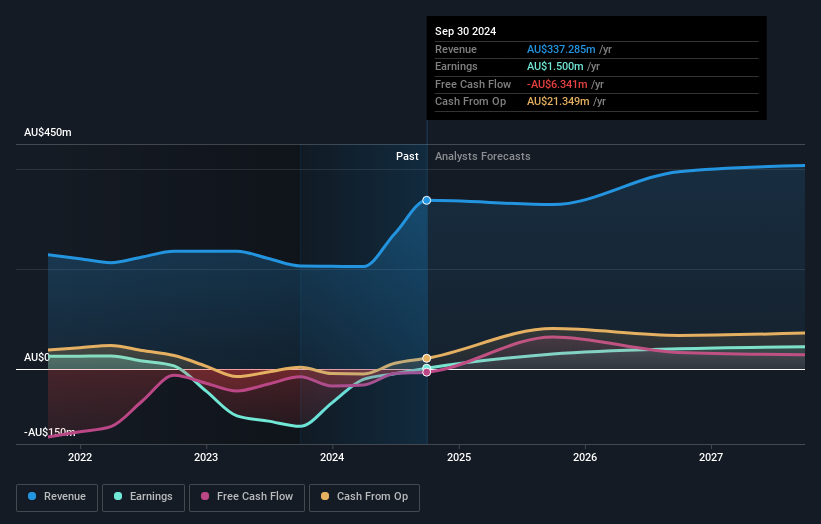The past five-year earnings decline for Select Harvests (ASX:SHV) likely explains shareholders long-term losses

Select Harvests Limited (ASX:SHV) shareholders should be happy to see the share price up 12% in the last month. But that doesn't change the fact that the returns over the last five years have been less than pleasing. In fact, the share price is down 52%, which falls well short of the return you could get by buying an index fund.
Although the past week has been more reassuring for shareholders, they're still in the red over the last five years, so let's see if the underlying business has been responsible for the decline.
Check out our latest analysis for Select Harvests
We don't think that Select Harvests' modest trailing twelve month profit has the market's full attention at the moment. We think revenue is probably a better guide. As a general rule, we think this kind of company is more comparable to loss-making stocks, since the actual profit is so low. It would be hard to believe in a more profitable future without growing revenues.
Over five years, Select Harvests grew its revenue at 0.3% per year. That's not a very high growth rate considering it doesn't make profits. This lacklustre growth has no doubt fueled the loss of 9% per year, in that time. We'd want to see proof that future revenue growth is likely to be significantly stronger before getting too interested in Select Harvests. When a stock falls hard like this, some investors like to add the company to a watchlist (in case the business recovers, longer term).
You can see how earnings and revenue have changed over time in the image below (click on the chart to see the exact values).

We consider it positive that insiders have made significant purchases in the last year. Having said that, most people consider earnings and revenue growth trends to be a more meaningful guide to the business. So we recommend checking out this free report showing consensus forecasts
What About The Total Shareholder Return (TSR)?
We've already covered Select Harvests' share price action, but we should also mention its total shareholder return (TSR). Arguably the TSR is a more complete return calculation because it accounts for the value of dividends (as if they were reinvested), along with the hypothetical value of any discounted capital that have been offered to shareholders. Select Harvests' TSR of was a loss of 48% for the 5 years. That wasn't as bad as its share price return, because it has paid dividends.
A Different Perspective
Select Harvests' TSR for the year was broadly in line with the market average, at 23%. To take a positive view, the gain is pleasing, and it sure beats annualized TSR loss of 8%, which was endured over half a decade. While 'turnarounds seldom turn' there are green shoots for Select Harvests. While it is well worth considering the different impacts that market conditions can have on the share price, there are other factors that are even more important. Consider risks, for instance. Every company has them, and we've spotted 2 warning signs for Select Harvests you should know about.
If you like to buy stocks alongside management, then you might just love this free list of companies. (Hint: most of them are flying under the radar).
Please note, the market returns quoted in this article reflect the market weighted average returns of stocks that currently trade on Australian exchanges.
If you're looking to trade Select Harvests, open an account with the lowest-cost platform trusted by professionals, Interactive Brokers.
With clients in over 200 countries and territories, and access to 160 markets, IBKR lets you trade stocks, options, futures, forex, bonds and funds from a single integrated account.
Enjoy no hidden fees, no account minimums, and FX conversion rates as low as 0.03%, far better than what most brokers offer.
Sponsored ContentNew: Manage All Your Stock Portfolios in One Place
We've created the ultimate portfolio companion for stock investors, and it's free.
• Connect an unlimited number of Portfolios and see your total in one currency
• Be alerted to new Warning Signs or Risks via email or mobile
• Track the Fair Value of your stocks
Have feedback on this article? Concerned about the content? Get in touch with us directly. Alternatively, email editorial-team (at) simplywallst.com.
This article by Simply Wall St is general in nature. We provide commentary based on historical data and analyst forecasts only using an unbiased methodology and our articles are not intended to be financial advice. It does not constitute a recommendation to buy or sell any stock, and does not take account of your objectives, or your financial situation. We aim to bring you long-term focused analysis driven by fundamental data. Note that our analysis may not factor in the latest price-sensitive company announcements or qualitative material. Simply Wall St has no position in any stocks mentioned.
About ASX:SHV
Select Harvests
Engages in the growing, processing, packaging, and selling of almonds and its by-products in Australia.
Reasonable growth potential with imperfect balance sheet.
Market Insights
Community Narratives



